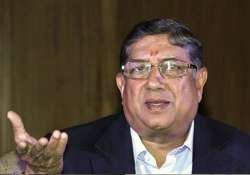Difference between commercial and professional engagement: SC
New Delhi: Dragging names of former players donning different roles in cricket did not cut much ice for N Srinivasan to remain at the helm of BCCI affairs, as the Supreme Court drew a clear

New Delhi: Dragging names of former players donning different roles in cricket did not cut much ice for N Srinivasan to remain at the helm of BCCI affairs, as the Supreme Court drew a clear distinction between commercial interest and professional engagement of a player on account of his proficiency in the game.
"There is a difference between commercial interest referred to in Rule 6.2.4 and professional engagement of a player on account of his proficiency in the game.
"It may be logically contended that engagement of a player even though made on a remuneration remains a professional engagement because of his professional skill in the game of cricket and not because he has made any investment like India Cements Ltd has done in acquiring a franchise or in any other form," a bench headed by Justices T S Thakur said.
The remarks were made in the wake of submissions of the BCCI and its President-in-Exile that if administrators were held to be disentitled for having any commercial interest in BCCI events including IPL, it may adversely affect not only the IPL format, but disqualify certain outstanding sports persons from getting engagements like coaches, mentors, commentators or other similar positions as they are often engaged "by reason of their proficiency in cricket".
It was also contended that if the amendment in 6.2.4 rule of the BCCI is interperated to oust Srinivasan from BCCI for being the Managing Director of India Cement Ltd which owns IPL team Chennai Super Kings, the same rule will come in the way of former players for donning multiple hats.
BCCI had submitted a list of players including former greats Sunil Gavaskar, Ravi Shastri and Saurav Ganguly and administrators with commercial interest in the IPL.
The list also included the names of Anil Kumble, Krish Srikkanth, Venkatesh Prasad and Lalchand Rajput.
Negating the arguments, the apex court said there was a difference between "commercial interest" mentioned in Rule 6.2.4 and "professional engagement" of a player on account of his proficiency in the game.